Trump Explores Adding a Dedicated Cryptocurrency Role to the White House

BREAKING: In a significant move that could signal a new era for digital currencies, President-elect Donald Trump's transition team is actively considering the creation of a unique White House position focused exclusively on cryptocurrency policy. This development, if realized, would mark the first time in history that the White House has designated a specific role for overseeing the rapidly evolving landscape of digital assets.
JUST IN: 🚨 President-elect Trump and his team are in discussions to create the first ever White House crypto role. According to Bloomberg, they are currently vetting candidates for the job. pic.twitter.com/eO11xsu4T0
— DΛVID (@DavidShares) November 20, 2024
Discussions within Trump's circle are centered around the potential establishment of what insiders refer to as a "crypto czar," according to Bloomberg. This role would not only coordinate crypto policies but also ensure direct communication lines with President Trump himself, reflecting the growing weight of the cryptocurrency sector within political spheres.
The idea of such a position comes at a time when Trump has openly embraced the crypto industry during his campaign. He promised to replace current Securities and Exchange Commission (SEC) Chair Gary Gensler, known for his stringent regulatory approach towards digital assets. Trump's vision includes not only easing the regulatory burden but also establishing a presidential advisory council for crypto, which has already sparked interest among industry leaders for potential involvement.
This week, Trump engaged directly with key figures from the crypto world, holding meetings with executives from Bitcoin mining operations and cryptocurrency exchanges. These interactions are part of a broader dialogue aimed at integrating the crypto sector more deeply into governmental frameworks. His personal involvement in the crypto space is not limited to policy; Trump has ventured into cryptocurrency-related businesses. Recently, he introduced his fourth collection of nonfungible tokens (NFTs), and he's involved with World Liberty Financial, a venture that, while somewhat nebulous, ties into his growing interest in digital finance.
The proposed role for this crypto-centric position within the White House would involve leading a small but specialized staff. This team would act as a pivotal liaison between Congress, the executive branch, and regulatory bodies like the SEC and the Commodity Futures Trading Commission (CFTC). The aim is to streamline the regulatory approach towards cryptocurrencies, ensuring that the innovation in digital finance is neither stifled by excessive regulation nor left unchecked, potentially leading to market instability.
High-profile figures like Brian Brooks, former executive at Coinbase Global Inc. and Binance.US, have been in discussions with Trump. Brooks, who also emerges as a potential candidate for the SEC chair, discussed with Trump the future of digital assets regulation and policy. Similarly, Coinbase CEO Brian Armstrong has had conversations with the president-elect, indicating a strong push from industry leaders to have a voice at the highest levels of government.
These meetings took place at Trump's private club, Mar-a-Lago, where not only policy but also personnel decisions are being deliberated. The location itself symbolizes the informal yet consequential nature of these talks, where the future of financial technology in America is being shaped by direct presidential engagement rather than through traditional bureaucratic channels.
Never miss breaking news
Sign up and be the first to know when we publishHowever, the transition team has remained tight-lipped about the specifics, possibly due to the fluid nature of the discussions or strategic silence on personnel announcements. This approach keeps the crypto community and the public alike in anticipation, as the exact nature of this role, its powers, and its position within the White House pecking order remain to be fully defined.
The establishment of such a position would not only legitimize cryptocurrency within the American political and economic landscape but also potentially set a precedent for how other nations might integrate digital currencies into their governance models. As the world watches, the crypto industry stands on the brink of gaining unprecedented access and influence at the highest level of U.S. political power, potentially reshaping financial regulations for decades to come.

